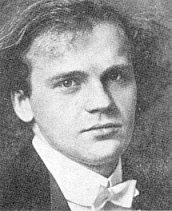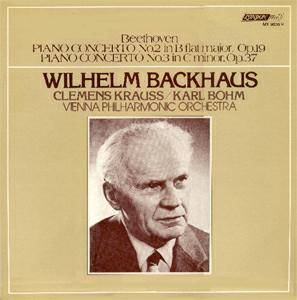* BACKHAUS, Wilhelm(16th Mar. 1884 ~ 5th Jul. 1969)
[ Lion of the keyboard ]
1. Curriculum Vitae
 [ Left Photo ] Backhaus at 22-year-old
[ Left Photo ] Backhaus at 22-year-old
The most of titans of piano we have known well played the Austro-German works(otherwise we had better say they were not ^^), but there are not many 'pure German' in them. Russian(Moiseivitch, Horowitz, S.Richter, Oborin), Jewish(Rudolf Serkin, Artur Rubinstein), English(Myra Hess, Curzon)... Edwin Fischer, Kempff, and Backhaus were rare German, moreover Backhaus was said he was born as an artist of German classic, and incarnation of German style.
Backhaus
was born in Leipzig. His mother, amateur pianist, began
his musical tutorage. He was taught by Aloys Leckendorf
at Leipzig Conservatory from 1891 to 1899. In 1898, he
went to Frankfurt am Main, becoming Eugene d'Albert's
pupil. D'Albert was pupil of Liszt and well-known for his
Beethoven interpretation. There are contradictory
opinions on this lesson to Backhaus' musical growing.
In 1900, he bagan concert tour and
played with Gewandhaus Orchestra conducted by Arthur
Nikisch. His fame was spread worldwide after the
Rubinstein Competition in Paris, August 1905, at which he
won the first prize. Though the great composer Bela
Bartˇk was competitor in this competition, he said,
"Backhaus really played very beautifully."
His New York debut took place on 5th
January 1912. In the concert, he played 'Emperor'
concerto and hailed as virtuoso everywhere in USA. He
toured South America, Asia and Europe till then.
He was a pipe smoker, and his private
life is curtained up to now. His interest was only
playing, especially solo. I have never heard him enjoy
chamber musics, whose recordings are only two items. His
teaching did not last long - Manchester Royal College of
Music(1905), Curtis(1925~26), etc. Except for his
military service in World War I, he concentrated all of
this time on playing on stage and recordings. Even the
Nazi regime could not stop his playing, which allies
listed him up as Nazi colleague temporarily. His total
concert appearances are said to be over 4000 times. A
little before Backhaus' death, Andor Foldes farewelled
him "Do your favorite things much". He said
"Very good greeting", because 'favorite things'
were concerts to him. Even at 85!! Anyway, his age seemed
to be no problem to him. At a session of Brahms's
Concerto No.2 with B÷hm, he said to others "This
guy plays Brahms well in spite of his age", at which
they burst into laughter. In fact, B÷hm was
younger than he by 10 years - the session was held when
Wilhelm was 83 and Karl 73....
After World War II, he settled at
Lugano(Swiss), and was admired as one of the great
interpretors of Beethoven and Brahms by everyone. His
nickname 'Lion of the keyboard' has been only for him from now
on. His last recital took place on 28th June 1969, of
which he died of heart failure seven days later at a
hospital in Villach(Austria). He was buried in Cologne.
2. His art & recordings
 When he travelled in USA,
a critic reported "His technique was like god".
Of course his technical perfectness at young age is
surpassed by none, but I cannot say all of the Decca
recordings are technically perfect. 78s and monaurals are
flawless, but there are some technical problems in the
stereo recordings, especially after middle of 60s -
Beethoven's sonata No.3, last concert, etc. None
the less, I think many Beethoven and Brahms recordings of
his are deserved to become a creteria. His playing style
is often characterized as perfect technique, somewhat
fast tempi, straightness, and power. But most of all, his charming point
is soft and mature sonority and deep lyricism. The beauty of his tone is
undoubtedly first class in his contemporaries. I have
never heard more beautiful and heart-touching melody line
in Beethoven's sonata No.31(Klagender Gesang)
than his 1966 Decca recording. At the second movement of
Beethoven's sonata No.32, the contrast of the
breathtaking strain and relaxing is uncomparable to any
recording. Knowing not these aspects of his but only his
image as powerful pianist, you will be disappointed by
his late Decca records. I think it does not justice to
Backhaus that we criticize Backhaus if Gilels(called
Iron-pianist) is not criticized though his late
recordings are very lyrical and soft. It results from
misunderstanding Backhaus' artistic essences.
When he travelled in USA,
a critic reported "His technique was like god".
Of course his technical perfectness at young age is
surpassed by none, but I cannot say all of the Decca
recordings are technically perfect. 78s and monaurals are
flawless, but there are some technical problems in the
stereo recordings, especially after middle of 60s -
Beethoven's sonata No.3, last concert, etc. None
the less, I think many Beethoven and Brahms recordings of
his are deserved to become a creteria. His playing style
is often characterized as perfect technique, somewhat
fast tempi, straightness, and power. But most of all, his charming point
is soft and mature sonority and deep lyricism. The beauty of his tone is
undoubtedly first class in his contemporaries. I have
never heard more beautiful and heart-touching melody line
in Beethoven's sonata No.31(Klagender Gesang)
than his 1966 Decca recording. At the second movement of
Beethoven's sonata No.32, the contrast of the
breathtaking strain and relaxing is uncomparable to any
recording. Knowing not these aspects of his but only his
image as powerful pianist, you will be disappointed by
his late Decca records. I think it does not justice to
Backhaus that we criticize Backhaus if Gilels(called
Iron-pianist) is not criticized though his late
recordings are very lyrical and soft. It results from
misunderstanding Backhaus' artistic essences.
And his playing has much influences on
the young generations from now on. Pollini selected him
as one of the most admired pianist by him at youth, and
Kovacevich said him as "the only pianist that
understood Hammerklavier Sonata".
His
recording company was EMI and Decca, to which he belonged
after 1950. At HMV era, he recorded Brahms' piano works
under Gaisberg's control, and more works than Decca era.
Interestingly, there are very small amount of German
works in the acoustic era(1900~20), and they(Beethoven,
Brahms, Schumann, Schubert..) became more frequent only
after the advent of the electrical recording technique.
After it, his recording repertoire was almost restrained
in Austro-German works. All recordings of 78s era can be
bought only as Japanese issues, but Pearl, Biddulph, and
EMI fragmentarily did.
In Decca era, there were little works
other than German ones(Chopin recital is not issued as
CD). He taped the complete Beethoven Sonatas and
Concertos, Brahms' Concerto Nos. 1 & 2 in monaural.
After 1955, his main activity in studio were rerecording
of these works as stereo and recording other composers
including Mozart, Bach, Schubert, Schumann. Decca
International issued almost all of his stereo recordings
as the 'Backhaus edition', and some of monaurals released
as 'Historic' series, but deleted from catalogue except
Beethoven and Legends release(2 concertos with B÷hm).
In his records, I
recommend Mozart No.27 and Brahms No.2 with B÷hm(in Legends
series) as the first.
He sculptured the natural beauty of No.27 as if we saw
the sunset, and played matchlessly in the mature
expression in No.2 though it's inferior to his former
recording with Schuricht at the technique. Note to the
manga fans ; in 'Kareshi Kanojo no Jijyo' by TSUDA
Masami, it is this recording(with B÷hm)
that Arima take to Yukino's home(the famous scene that
Yukino kicked Arima). The author's hobby is classical
music as the readers can see in the tankoubon notes, and
she must have known this record is very famous to the
Brahms fans.
In the Beethoven recordings, concerto
No.3(with B÷hm) and No.5(with Krauss) in
monaural, and No.1/4(with Schmidt-Isserstedt) are good,
but monaural recordings are not in the international
catalogue. I prefer 3 great sonatas and No.30~32 in the
complete sonata album. In special, No.30~32 are very
supreme and never inferior to any other recordings. But there are some technical
problems in his late recordings in this set, so I wish
the monaural set be released by international version.
In his Brahms, Concerto No.2(with B÷hm) is
most eminent, but of course No.1(with B÷hm) and
No.2(with Schuricht) are also very good. The latter is
appreciated better to the peoples who dislike a little
technical instability of the stereo version. Small pieces
including op.118 are strong and noble. Though discarded
from catalogue, 2 cello sonatas with Pierre Fournier shows his solid technique and
music-making in chamber music. This is one of the two
chamber music recordings of his with Schubert's Trout
in 78s era.
Others are not regarded more or less, but
Bach and Haydn recitals are individual and noble.
Mozart's sonatas are somewhat old-fashioned, but strongly
structured(not too graceful!). We can see
Schubert's Moment Musicaux, Mendelssohn's Lieder
ohne Worte in the catalogue(now deleted from
catalog). I think his Chopin is too solid, anyway it is
available by Testament. His live recording is not much,
but Carnegie Hall recital of 1954 is very good - as good
as his studio recordings of the same works. It was
available by Philips 20th century pianist series with
Brahms concerto no.2 monaural recording but the series is
now rare. His last recital is worth more by historical
archive of a virtuoso than by the playing quality.
It is not easy for us to find the key to the real reason he was able to stand at the top of artists' world for so long time, but there are some episodes. In his last years, he played with VPO in Vienna at a concert, where the audiences and even the orchestra members gave him thunder-like applause. After the concert, he said with a perplexed face. "Now I returned to the start-line of my life. When I stood at stage at 12, all told me that you were great considering age. Now, all say the same to me" And Backhaus had never depended on only his born-talent. They say there was a painting of very sad miner in his house. Whenever he was asked why he had so sad picture, he replied "Whenever I see the picture, I realize my labor is not harder than his". And when he was asked what was a key to his perfect technique, he said, "Only scale. Scale + alpha".
[ Right Photo ] Backhaus(by Decca)
(c) 1999~ , Youngrok LEE ; Link free, but please get my approval before you reuse, copy, or quote this materials.
Created ; 15th Dec. 1999
Last Update ; 9th Apr. 2006